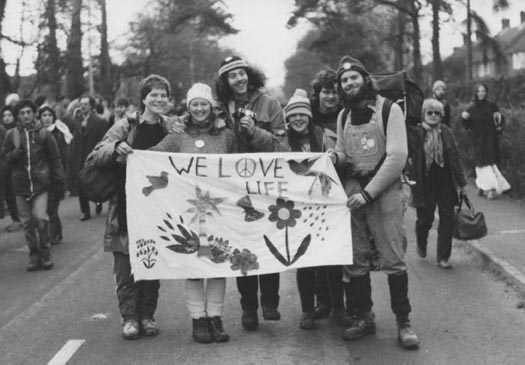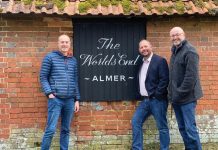After a lifetime trying to make the world a better place, Chris Savory has written a book about his years as a peace activist. He talked to Fergus Byrne.
Taking part in the World Peace march across America in 1982, Chris Savory felt a sense of joy and a belief in the possibility that politicians just might sit up and take notice. He felt pride at being part of a principled movement for the betterment of humanity. But when the police arrived, he also discovered his innate fear of violence.
These are some of the memories that set the scene in Confessions of a Non-Violent Revolutionary, a book Chris has written about his time as a peace activist in the 1980s. The book tells the story from his first direct action—sitting on the floor of the Guardian’s office in London demanding to speak to a journalist, through to bravely standing between police and stone-throwing anarchists to prove non-violence was a better alternative. It follows the engrossing journey of one man’s total dedication to bringing about nuclear disarmament and details the many highs and lows of his years of political struggle.
However, the life that he led might have been very different. Arriving in Pittsburgh and joining up with the peace march in 1982 was just one aspect of a dramatic change in both lifestyle and ambition for Chris. In his A level year he had been tipped to be Head Boy, get a County trial for rugby and take Oxford entrance exams. But the Chris Savory that then went on to Oxford to study Economics was to disappear off the face of the earth. Like many people at that stage in their lives, something simply didn’t fit. As he points out in the book: ‘It’s not unusual for people in their late teens and early twenties to look at the future mapped out for them and recoil in horror at the restrictions and responsibilities that this implies.’ But for Chris it wasn’t just the restrictions or responsibilities that were an issue.
In 1981, living at his Gran’s house outside Cowley in Oxford he had become disillusioned with his perceived future. He asked college authorities to let him have a year off study to find his motivation again. Already a part-time activist for a year, he felt the threat of nuclear crisis was so acute he wanted to devote all his energies to averting it. He described himself as a performing ‘exam monkey’ and wondered ‘would my sixteen O-levels protect me from a nuclear attack?’ He was losing faith in the potential for a meaningful future.
As he cycled past Magdalen College he felt there were people of power and wealth who were oblivious to the threats posed by the escalating nuclear arms race and the prospect of ecological disaster. He knew from his time at Oxford that he didn’t have the right family background to ever rise to a position of power. His only hope, he thought, was to be a ‘trusty lieutenant’ to the ruling class. With the final exam of the first year over, he celebrated and on the way home bought fish and chips. He recalled, however that, ‘freedom tasted sour: salt, vinegar and loneliness.’
After dropping out of college he visited a careers advisor who berated him for throwing away his opportunity. Chris decided: ‘I’ll show you, you bastards. I will find a way to be authentic and change the bloody world into the bargain.’ He joined a commune in Wales where he was both influenced and irritated by the commune leader who accused him of playing at living an alternative life. ‘The last thing I wanted was to be a champagne socialist, a demo-dilettante, a smug middle class intellectual’ he said. Although stung by these criticisms, he knew his change of lifestyle and road to activism had emerged from a deep and genuine fear of nuclear holocaust.
His efforts over the next few years saw him organising and participating in a wide range of protest in Germany, Belgium, America and of course all over England. He was also part of a theatrical troupe that, through street theatre, brought a message of peace anywhere people would listen.
‘I was as shocked as anybody that I decided to do these things’ he said. ‘It was quite sudden in a way. Certainly up to the age of about 17 there was no hint of this possibility.’
In the end, however, his attempts to change the world, although valiant, were ultimately to be thwarted by a more powerful establishment. ‘The system, the state, the powers that be, fought back’ he said. And it’s not a spoiler to say that the end result has created a book that is as much about the death of opportunity as it is about the passion that drove many people to protest for so many years.
His journey, although starting from a deeply entrenched belief that non-violent direct action (NVDA) could make the world a better place, was ultimately futile. ‘Blockading bases hadn’t stopped Cruise and Trident. Mass demonstrations, peace marches, peace camps, die-ins, publicity stunts, petitions, opinion polls, letter writing, boycotts, voting, fasting, praying, singing, posters, conferences, nuclear-free councils and even our street theatre hadn’t got rid of a single weapon.’
Confessions of a Non-Violent Revolutionary came about for a number of different reasons. Speaking from his home in Bridport, Chris explained that the story of those years as an activist in ‘Thatcher’s Britain’ was something that he couldn’t really explain at a dinner party. He hoped the book would give an insight into the peace movement of the 80s as well as help him get a better understanding of how it had affected him, and perhaps some of those around him. He also hoped to pass on some of the lessons learnt. ‘One of the things about radical politics is that people don’t learn lessons from the past’ said Chris. ‘You dive into it full of youthful passion and often make the same mistakes that people have made in the past. If some young people read the book and learn a few lessons, then they might not have to go through some of the things I did.’
Confessions of a Non-Violent Revolutionary offers a depth of honesty that is refreshing, whilst also disconcerting. Protest, demonstration and challenge all play a vital part in the democratic process but there is little thanks for those that devote their lives to righting perceived wrongs. For Chris, and perhaps for many others, the battle becomes a mental challenge, not just in dealing with powerful authorities but also in dealing with disillusionment and self-esteem.
‘When I started down the road of protest and struggle for change, I had absolutely no idea how powerful this feeling of isolation from society would be, or how much pain it would cause me’ he said. ‘These feelings had pushed me towards a hatred of society which, coupled with despair at the failure of our movements and the still burning sense of urgency for disarmament, led me to a very dark place.’ He had a serious emotional breakdown and today suffers debilitating bouts of depression and exhaustion.
His hope now is that organisations will be more aware of the emotion that drives people to take a stand. ‘As a society we’ve got to take emotions more seriously’ he says.’ A lot of the violence and anger we see comes from emotional distress. It’s very easy as a young or even older person to decide to try to change the world. But when that hope is dented, it’s really important to deal with those emotions, and in the movements I was involved with, that didn’t happen.’
Chris has spent his whole adult life trying to make the world a better place through protest, local politics, working in the education sector, community campaigns and volunteering for social enterprises, and although it’s questionable whether that has been the best option for his health, he still believes there is hope.
Last year, for the first time in decades, he attended a protest. At the Extinction Rebellion demonstration on Waterloo Bridge he crossed the line to join the protesters. ‘I’m not ready to sit down for hours or to be removed by the police’ he said. ‘But I am able to identify myself as a rebel and show solidarity for an hour or two. It turns out that it’s not so easy to extinguish that flame of hope. As the crisis deepens I know which side I’m on.’










